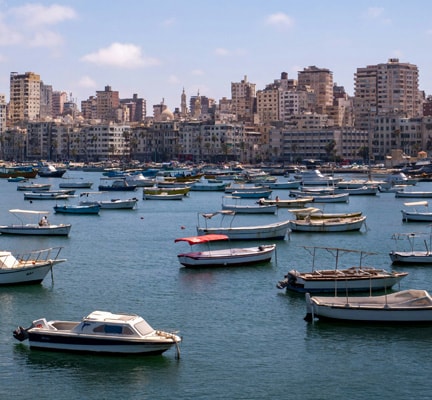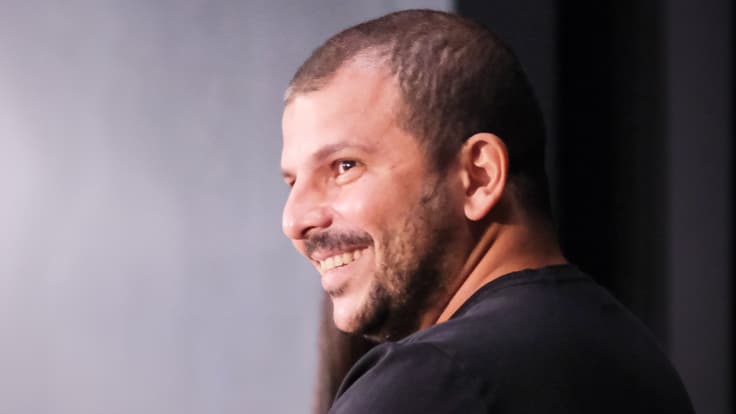SUSTAINABILITY IS ABOUT THE HUMAN ASPECT TOO
Ahead of his appearance at Sustainable Cities in Action Forum 2024, media artist, interdisciplinary designer, architect and founder of HSNRGB Studio Hassan Ragab proposes that people, not planners, shape truly sustainable cities
The city is a complex and emergent system. You can’t force the city
Citing his hometown, Alexandria (pictured top), Hassan Ragab urges planners and architects to factor social, cultural and heritage considerations into their approaches and practices
What is your take on the role of architects and designers in shaping sustainable cities?
There’s lots of research into how we create environmentally sustainable buildings. But sustainability is not just about the environment, it’s about the human aspect too. There’s a gap in understanding of the social context, especially in old cities. The nature of old cities, like Alexandria, where I’m from, is very different compared to modern cities such as those in the US, where I’m now based. It’s a different dynamic for designers and architects and unless you actually live in these places you aren’t in the best position to understand them. These cities are ancient and they are wise. And this wisdom is not only about the architecture, but also the intangible parts of the city, which revolve around people and their connection to the city.
Modern cities built in the 20th century were designed to become sustainable and smart. But they overlooked other beneficial aspects and that has created problems. The issue is that modernism frames the city as a generic object that can work anywhere, like a machine. But it has been proven over the last century that this approach is wrong. You have to look at the city from a contextual point of view.
Do you see progress in that direction?
Each city has not only different weather it also has different geopolitical and cultural aspects. Today I see a lot of people trying to integrate that social aspect through, for example, heritage. Maybe what’s next is adapting new technology that helps us overcome global warming but also incorporates considerations of heritage, bearing in mind that there are a lot of heritage techniques developed over time that respond to climate. For example, there’s one American-Mexican architect whose work I love. He’s developing a building technology using traditional adobe but he’s also using robotic arms to build the homes. It’s an example of a cohesive and promising concept that has cultural context. This is architecture that is meaningful.
Tell us more about the role of technology in designing socially contextual and environmentally sustainable cities.
At this point I don’t want to focus too much on technology because first we need to discuss this in a philosophical way. My big focus right now is on artificial intelligence and this technology has not yet really touched on urban design and architecture to deliver the impact that we want. Understanding this technology first at a conceptual and abstract level is important so that when the time comes, we’ll be ready to use it wisely.
If you look at the history of technology, there’s not always a lot of wisdom in how it’s been used. Eventually, though, I believe AI presents an opportunity for more empathetic and humanistic approaches because it can provide a very broad perspective due to the quantities of data. It should make us understand things in a more authentic way. A lot of issues in urban design and architecture are because we don’t have the context. But with AI, we do. That means there’s less excuse to become centred around just one idea. I really hope that AI will create more context for people and practitioners to make better things.
What else gives you cause for optimism?
This event [Sustainable Cities in Action Forum 2024] gives me hope, including the fact that somebody like me, who’s not a technical person but an artist whose approach is through very abstract thinking, has been given an opportunity to speak about the future of sustainable cities. On a final note, though, we must remember that the city is a living, dynamic being. A city like Cairo was developed over millennia. No one planned it. The city is a complex and emergent system. You can’t look at it through a lens of modernism. You have to understand that cities need to breathe and to move on. You can’t force the city.
SUSTAINABLE CITIES IN ACTION FORUM 2024
From 5 - 6 March 2024, more than 400 urban leaders and experts gathered at The Nexus, Expo City Dubai, for the inaugural Sustainable Cities in Action Forum. During a packed programme of dynamic panel discussions and cutting-edge workshops, delegates from all walks of life explored actionable solutions for catalysing urban development across the Middle East, Africa and South Asia.
If you are interested in being part of future editions of the Forum, sign up here
We'd love to connect with you
For general enquiries, please fill out the contact form or send an email to impact@expodubaigroup.ae




